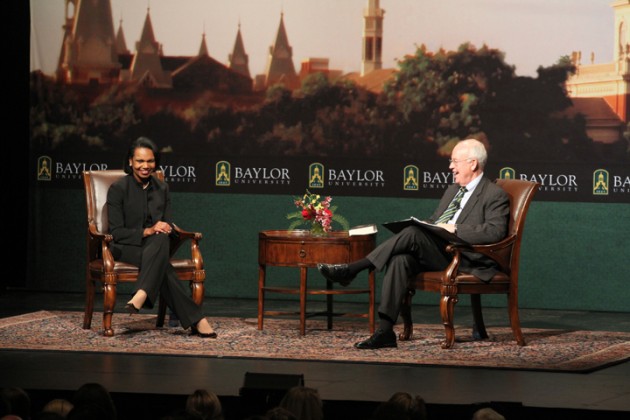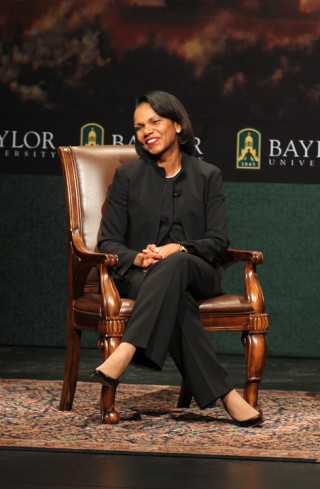White House guest discusses childhood, defends post-9/11 Bush administration

Matthew McCarroll | Lariat Photographer
By Daniel C. Houston
Staff Writer
Members of the Baylor community poured into a packed Waco Hall on Wednesday to hear former U.S. secretary of state Dr. Condoleezza Rice discuss U.S. foreign policy issues and her new book with Baylor President Ken Starr.
Rice defended the Bush administration’s decision to use military action against Saddam Hussein’s Iraqi regime even though Iraq was not found to be developing weapons of mass destruction.
The administration used Iraq’s alleged development of such weapons as a justification for going to war.
“The weapons of mass destruction, that reporting turned out not to be right,” Rice said. “But I will tell you that I’m very grateful that Saddam Hussein is gone, that the Iraqis have a chance to build a decent democratic society there—they’re stumbling forward, but young democracies always do—and I’m really glad … that we’re not sitting here talking about a nuclear arms race between Saddam Hussein’s Iraq and [Mahmoud] Ahmadinejad’s Iran.”
Dr. Elizabeth Davis, executive vice president and provost, introduced Rice and highlighted her academic experience as provost of Stanford University, as well as her contributions to U.S. foreign policy decisions.

Meagan Downing | Lariat Photographer
“Dr. Rice’s appointment as the chief diplomat for our nation in a post-9/11 era placed her in a unique position to shape history,” Davis said. “She has described this work and the circumstances that surrounded it in her new book, ‘No Higher Honor: A Memoir of My Years in Washington.’ This candid and revealing account of her service at the highest levels of government forms the basis for tonight’s conversation.”
When asked about her upbringing as a young black woman in the segregated town of Birmingham, Ala., Rice said her parents, whom she described as “ordinary but extraordinary,” were supportive of her pursuing an education that she believes led to her success.
“This was a family that valued education—the transforming power of education,” Rice said, “and in the segregated South it was a way to say to a young kid like me … ‘If you work hard and you’re twice as good, you can be president of the United States if you want to be,’ and I became secretary of state instead.”
Rice advised college students in attendance to find and pursue a course of study they are passionate about even if it takes a bit of searching, citing her decision in college to drop her music major in favor of international studies. She also said one of the best things a college student can do to foster a new career is to find mentors who are invested in his or her future.
Throughout the evening, Starr guided the discussion by drawing from passages in Rice’s book, asking Rice at one point about the days that followed the Sept. 11 terrorist attacks during which she served as President George W. Bush’s national security adviser. Rice recalled an instance in which she was able to use her academic expertise about the Soviet Union in the days following the attacks to avert a potentially dangerous scenario with the Russia.
“I knew that … if our military increased its readiness level, the Russians would see it and they would increase theirs, and pretty soon it would get into a dangerous standoff,” Rice said. “And so I thought, ‘I better call the Russians.’ So I talked to President [Vladimir] Putin and I explained to him that we were raising our alert levels.
“He said, ‘I know. We’re bringing our alert levels down; we’re canceling our exercises. Is there anything else I can do?’
“And I thought, ‘The Cold War really is over.’”
Rice also weighed in on the Israeli-Palestinian conflict, arguing a two-state solution is needed but said an agreement must be reached with the consent of the state of Israel in order for a Palestinian state to be established peacefully and successfully.
“Unfortunately, now the Palestinians have gone a gambit which I think is very ill advised, which is trying to get acceptance through the UN of a Palestinian state. really they need to sit down and negotiate with the Israelis. This is going to go nowhere.”
The audience of more than 2,200 was so large that additional seating had to be set up onstage minutes before the beginning of the event, and anyone left without a seat was asked to leave the building in accordance with fire marshal policy.






